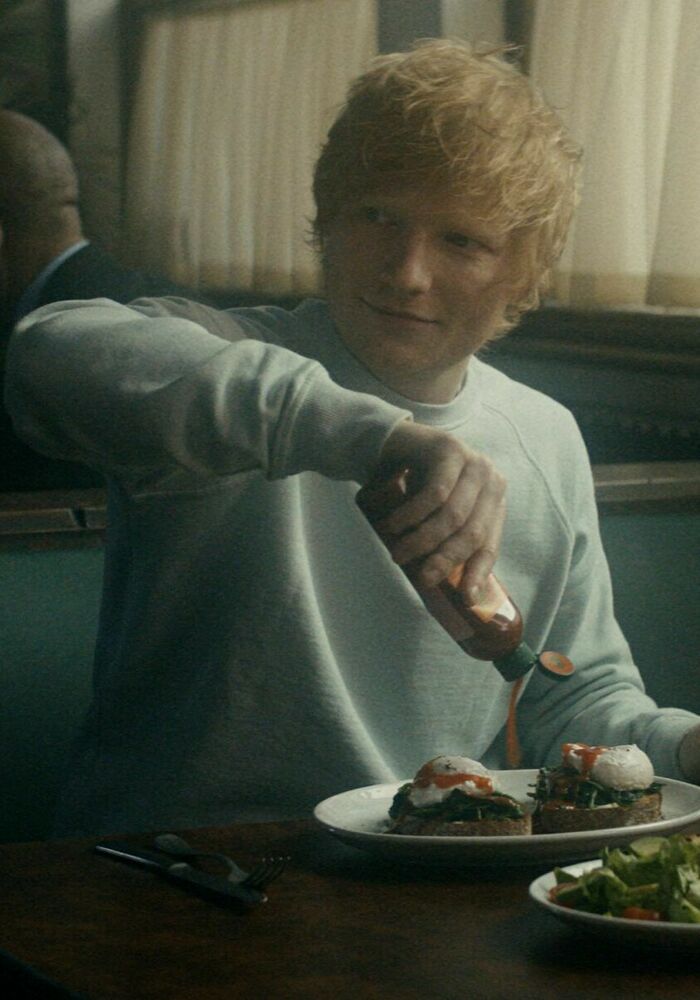Bob Workman, head of WMX (Warner Music Experience), artist and fan experience, SVP international artists and brand partners, has spoken to Headliner about Ed Sheeran’s new Tingly Ted’s hot sauce campaign with The Kraft Heinz Company, as well as the increasing demand for brand partnerships from artists today, and what makes for a great collaboration.
Last month, Sheeran and Heinz launched a new hot sauce branded Tingly Ted’s. The collaboration marked the culmination of over 18 months of work between Heinz and WMX’s Ventures division, a newly launched arm designed to offer artists and brands the opportunity to look through the lens of legacy, beyond music.
The campaign represented one of the most high-profile artist-brand partnerships to date for WMX, with artists of all levels seeking out ever new and innovative ways to connect with audiences.
To find out more about the art of great artist and brand partnerships, Headliner sat down with Workman to talk Tingly Ted’s, the opportunities available to artists beyond their music, and more…
Tell us about the recently launched WMX Ventures. What is its purpose?
Ventures is rooted within the overall WMX business, which is everything beyond recorded music, how we help our artists build their brand and build a legacy beyond what might be perceived as the limitations of recorded music. I’ve for many years been running the artist and brand partners part of Warner Music in the UK and WMX Ventures grew out of that, because we still have a really strong partnerships offering which is essentially where we are looking to build creative collaborations with brands. But where there is a pre-existing brief or an opportunity that comes in from a brand, we try to get that into shape and negotiate the terms and build a partnership. And then we facilitate that partnership to the degree that we help the artist involved to build the best outcomes.
Off the back of that we built a creative arm which was really intended to ensure that we could drive the agenda for insight driven campaigns, because often when you have incoming campaigns they don’t necessarily fit the brief for our artists. And often we would see campaigns coming in from really brilliant companies that were just not speaking to the artist proposition or their fans. So we felt we needed a bit more skin in that game and have more of a say in the campaign ideation space.
We decided to invest in some creative talent in-house. That was partly triggered by a brief we had from Levi’s a couple of years back and we ended up running their music project for them. It required creative agency style work. It’s rooted in music and in the broader ecosystem of music, but it’s ad industry style creative work, which is not something you typically find in a music company. So we built WMX Ventures out of the desire to give our artists the opportunity to create legacy beyond music. I’ve always been quite passionate about the idea that Warner Music as an overall business Is like a big engagement engine.
How does the pairing of artist and brand work?
It can start from either end of the spectrum. We spend a lot of time with our artists. We have an onboarding process for artists when they sign to the company and that’s where we find out what they are really about and get to know the person behind the music. And we respect the fact that our artists will often have other adjacent passions. Some are very single minded about the music, and we’ll just leave them to crack on and do that, but if you look at the artists we’ve worked with over the years, a lot of them are likely to be vocal about the football team they support or the latest fashion item that they’ve been bought or been gifted.
Data and insights are really vital for us. The fans and communities that exist around our artists are a big driving force and we are really aware of what those fans and communities want from the artists. The values proposition is really vital because values driven marketing campaigns are everywhere these days, and rightly so for many positive reasons, so it may be that there is a values piece at the heart of it. What we are always looking for is a central truth that exists behind a coming together of any kind.
In the case of Ed, he really loves hot sauce. He’s been growing chillies in his greenhouse in Suffolk, he happens to know more about chillies than anyone I’ve ever met, so you have an authentic platform there and a truth from which he can start talking and developing something.
Equally, when Coldplay talk about wanting to tour more sustainably, they are deadly serious about that and they have spent a fortune on people and activities to make a meaningful impact. They feel it’s something they have to do as a leading touring artist. So there is a truth and a platform so they have gained some sort of license to operate in that field.
Sometimes we have a particular idea from an artist that suits a particular category of brand and we make sure we go to the right brand, and sometimes it’s the other way around with a brand looking for an artist – sometimes we try to change the brief because we know there is a better way of doing things so that it works better for a particular artist. Getting down to how things execute and doing the right deals is something we are very particular about. And historically we have made mistakes. We’ve been at this for a long time and put our hands up and say there are things we did five years ago that we wouldn’t do the same way today.




